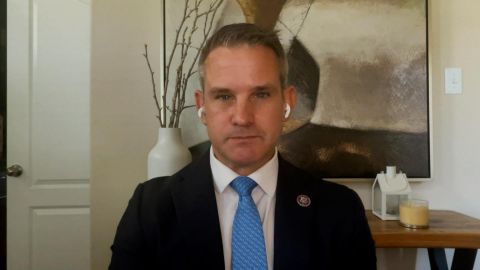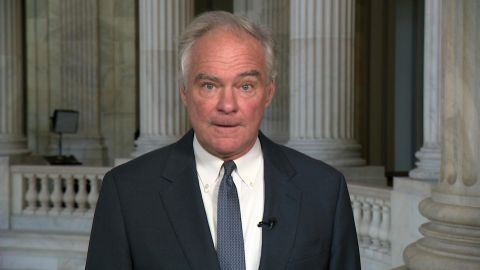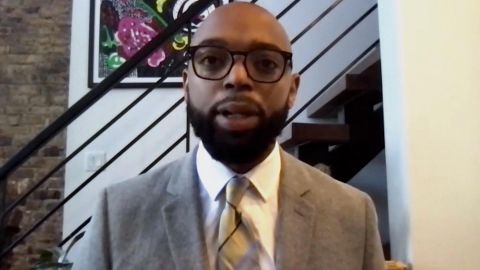Read Transcript EXPAND
CHRISTIANE AMANPOUR: And now, we return to those midterm elections. As we mentioned, the Democrats defied gloomy predictions. But still, what would it mean for President Biden’s agenda? Our next guest, “The New York Times” political reporter, Astead Herndon, has been paying close attention towards these results. And he is sharing his insights with Hari Screenivasan.
(COMMERCIAL BREAK)
(BEGIN VIDEOTAPE)
HARI SREENIVASAN, CORRESPONDENT: Christiane, thanks. Astead Herndon, thanks so much for joining us. Your big takeaways from last night?
ASTEAD HERNDON, NATIONAL POLITICAL REPORTER, NEW YORK TIMES: Oh, I think that we have several. I mean, the largest has to be that the Republican Party underperformed expectations and that we saw a real permanence of the stench that Donald Trump has left on the Republican brand. And a lot of the House races that they were expected to pick up in, particularly in those suburbs and a lot of statewide candidates that were hoping to have a chance at those Senate and governor races, Republicans fell short. And I think that is a pretty universal story even as it looks like they are going to be able flip the House of Representatives. So, I think that you are going to have an — I think, this morning, we have an interesting picture or margin where Democrats are kind of taking a victory lap even though they are going to probably lose one chamber of commerce and it’s — and chamber of Congress and it is Republicans who have been sentenced to soul-searching mode because they didn’t meet those expectations.
SREENIVASAN: What do you think was responsible for the ticket splitting that must have happened in several of these states where Republicans might have voted for somebody that they find maybe too much in the Donald Trump camp versus what would be a traditional Republican camp or Republicans who might have voted for the candidates but ballot measures that concern, say, abortion rights, decided to split with the party’s position?
HERNDON: Yes. I think it says that this Republican Party positions were out of touch with median voters. I mean, we shouldn’t over complicate it. It is a story that we often see being accused on the Democratic side has kind of come around to the Republican side that there was such a focus on this kind of specific Trump grievance and causes that it caused the party to really be out of step with the kind of core median midterm voter. Though, the districts we saw Republicans win last night are mostly the give me districts, the districts that were already drawn to them — to their advantage in redistricting and that they are almost baked into the cost of yesterday. They were not winning races where they had to persuade voters or had to really show strength in this environment, they mostly lost those races. So, I think your point is true that there is definitely a voter that we can talk about here, in Georgia or in places like Michigan, that split their ticket between a more — a conservative what — but what we might call a more traditional conservative and kind of keeping distance from the most Trumpy conservatives. I think if you are a Republican who doesn’t think — who thinks the Republican Party has gone too far, who thinks Donald Trump has been an anchor on the party, you are going to use today as really your alarm bell to say that the party has to really excise itself from those Trumpy messages if it wants to make the biggest gains.
SREENIVASAN: In your “Run-Up” podcast coming up to this, you talked to so many different voters from so many different states. Where do you think that loyalty still is and does kind of electoral performance end up maybe changing their minds on how long they choose to stay with the Donald Trump wing of the Republican Party?
HERNDON: I think that you’ve hit on the core question here. I mean, if — it’s clear that the Donald Trump impim (ph) — or Republicans has shrunk, right? So, even if we are talking about a Trump base, that is 25 percent of the party. That is 30 percent of the party. It is not driving the majority of Republicans and it’s certainly not driving the majority of the country. But the problem is, it is hardened, radicalized 25 to 30 percent. That it’s keeping its pressure on the Republicans. And to this point, has to — has shown no willingness to really migrate that support to a different candidate. And so, even with Republicans taking over the House, they are going to have to deal with that 25, 30 percent. That would be — those folks could be driving the investigations, could be driving the messages, could be driving what Kevin McCarthy feels more beholden to. So, I think your point is really true where the electoral results speak to a kind of universal takeaway that Donald Trump is holding Republicans back, but it is not — that is not a takeaway that has really stopped them so far. And you have not seen Republican’s kind of establishment figures even with Donald Trump’s missteps be able to take the party back from him. And so, it’s unclear to me that last night, even with all of that objective evidence, that they’re going to be able to finally pull that off. And I think the key — the first test that we’ll have there is Kevin McCarthy. What is the new House caucus? How are they sounding? Who are they empowering? Do they come out of this with a slim majority that they say, hey, maybe we should work with President Biden and should empower the more moderate swing voter side, or do they triple down on that base even though their electoral results yesterday would tell them that that might be a bad idea?
SREENIVASAN: This was also framed as a contest between two different narratives. One that perhaps the Dobbs decision, overturning Roe v. Wade, would be the animating force that gets Democrats to the polls. And then, later, well, maybe that happened too soon and really, it’s about inflation and crime, messages that Republicans really wanted to impress upon voters. It’s hard to think that the Dobbs decision did not have an impact when it comes to the young people that turned out to the polls, that women in suburban districts, otherwise, registered Republicans.
HERNDON: Yes. It totally seems to have had a big effect. And I think that’s born out in data for a lot of those, particularly in suburb districts, particularly for young people in those states that have referendums on the ballot where abortion was up to voters, you saw that really drive turnout. I think Michigan is a great example here. You have a Republican slate that had gone in that hyper conservative Trump direction and you had abortion protecting — the ballot measure to protect abortion on the ballot last night, and you saw that really drive Democratic enthusiasm. And for Republicans, the fact that they were out of step, where most voters were on abortion, really came back to hurt them. This is something that is going to continue going forward, even as, on the local level, we saw some results that went in the opposite direction. I mean, state legislatures are going to be able to enshrine those abortion laws in places like North Carolina and Wisconsin. But when you see that measure brought to the people, when you see that measure brought to the public, almost always you have seen them rally to protect abortion rights, even among some places that we might consider too conservative to do so.
SREENIVASAN: One of the races that — or one of the states that is pretty intriguing, and a lot of people were watching last night, was Georgia. You know, the voters that you spoke to that oppose abortion rights yet still vote for or support Herschel Walker, this ends up kind of giving us this look into a much more complicated decision-making process for some people.
HERNDON: Yes.
SREENIVASAN: You know, how does that work when you literally have a pastor running against a person who has been found to be deceiving on a very key issue that he is running on?
HERNDON: Yes. When I talked to Herschel Walker supporters about this, they were very kind of cleareyed on it. None of them said that — none of them disagreed with the fact that Herschel Walker looks like he has paid for multiple abortions in his life. What they were saying was that basically individual transgressions don’t matter to them as much as political power and as much as the ability to shape that. And so, one voter very clearly told me is, OK, he might have done that. But what he is going to do in Washington is help pass a ban for more abortions. And so, as someone who considers themselves pro-life, that voter was saying that is more important to them than his individual hypocrisy. And I think that this is something that a lot of kind of conservative evangelicals have made. And remember, that is a bargain they made with Donald Trump themself.
SREENIVASAN: Yes.
HERNDON: You know, that is not someone who reflects Christianity and his personal life in any sense of the word, but that was someone who they are willing to go along with because of what he can give them politically. They have made that same calculation.
SREENIVASAN: What’s your assessment of what happened in Pennsylvania, between John Fetterman and know that Mehmet Oz?
HERNDON: Yes. I think we have another case of weaker Senate candidates. I mean, this is someone who was always polling behind where they should be in a state like Pennsylvania. But in recent weeks, had closed that gap, and under the assumption that Republicans had come home, that Republicans had really rallied around that or that the debate had hurt Fetterman, particularly after he suffered a stroke. We did not see that debate performance really touched his poll or fundraising numbers, and that was proven out yesterday. Voters still — his voters came out and really rallied behind him. What you really did see is a Senate candidate in Mehmet Oz that turned — that blew an opportunity, a huge opportunity for Republicans in an open seat in Pennsylvania. Remember, this is a state Donald Trump won in 2016, in the place that was supposed to prove his kind of cachet among white working class, particularly outside of cities, that has not come to fruition in the Senate races. And I think that really speaks to what was the overconfidence that Trump could say anything, he could back anybody and his voters would come around to it. But his voters don’t have the same priority set as he does and maybe he likes watching Dr. Oz on television and he thinks he’s a good vessel for those messages but he was not someone who was the right calibration to take Trumpism to Pennsylvania. And that was the feeling after the primary. But it was kind of thought that it had changed a little bit in the lead up to the election. I think yesterday makes clear that certainly Mastriano and definitely Oz were wrong candidates for Republicans who really fumbled what they would consider a clear and easy target for victory in the midterm era.
SREENIVASAN: And depending on who you ask in the exit polls and leading up into the election, if they were Republicans, the issues of the — sort of inflation affects resonated with them. If they were Democrats, the sort of threat to democracy was resonating with Democratic voters. Did that work as a get out the vote strategy for the Democratic Party? And is that something that can be sustained between now and 2024?
HERNDON: I think we can say clearly that the Republican brand has been tainted by a view of extremism, and that was true across the board and it helped drive some Democratic support. I don’t know if that’s all completely tied to democracy protection. I don’t know if that’s extremism with abortion. I think it’s kind of all of the above rather than just singularly one. But I definitely think that for Democrats, the idea that the system had to be protected into that motivating some voters. When you look at Wisconsin, for example. Madison — whereas Dane County in Wisconsin, had huge turnout, actually, for the governor, ended up making up what was a less than expected turnout in Milwaukee. And so, that’s a shift for where Democrats are really getting those votes. It’s not from people of color in the cities. It is from a more affluent, collegiate base. It’s from a more college educated base. But though they are turning in Democratic votes to really stem their losses and other sides of the state. But I think that should inform us about that democracy message. If that is what saved Tony Evers in Wisconsin, a governor who really, really needed reelection and was running on that kind of democracy pitch, considering what Republicans have done, gerrymandering wise, in that state, that’s not a message that really resonated with people who feel the most affects in the city. In Milwaukee, the poorest folks in the state. That’s a message that he really got to work among the suburbs and among the more college educated class in Dane County. I think that that continues a trend where the base of Democrats are maybe getting a little wider, maybe getting a little more college educated, and that might help them in the midterms but that is also a response to the new type of messages they’re doing. That democracy protection is working among a certain cut set, but we should make sure we’re clear that the Democratic base is changing. And it is less driven, at least in last night’s results and in 2020, it’s less driven by a city — less driven by working class votes in the city.
SREENIVASAN: You know, last time we spoke, about four weeks ago or so, we were talking about the number of election deniers who were on the ballot. And I wonder if that has reached past its peak. Last — I mean, we also saw remarkably in Arizona yesterday, not only an increased police presence at the polls, we also saw the election board there trying to increase transparency, letting local news cameras in, watching — allowing people to see the tabulation. But we still have — I don’t know the exact number — probably 100 plus election deniers who are in office this morning, or will be in office after last night.
HERNDON: Hundred percent. I mean, it’s an important — and that’s an important calibration to make. And I think — because while certainly the biggest ticket election deniers did not succeed last night. People like Doug Mastriano, people in those Senate and governors’ races on the down ballot way — in the down ballot, in the state legislature or on some court seats. You have that viewpoint now enshrined into government. And I think that the people have kind of underestimated how much of that was set from the time of Republican primary. When Republicans back those individuals in their primaries, it ensured that Trumpism, election denialism had a home kind of, at least for the foreseeable future, in our political system. Now, Democrats have done — had defied political gravity to make sure that home does not make it fully to Congress or fully in all those governors houses. But you are right that election denial-ism and that false conspiracy, that Trump base push has won some core races yesterday. But it will be about whether they have the party willingness to follow through. When we were talking about a wave yesterday, you know, the hope among people who support Trump was going to be that the wind was so overwhelming, so complete that not only did they sweep into office but they had a mandate of action on the election front, on the abortion front, to really make those conspiracies turn out into law. That is not what they have. And so, the question will be, in my opinion, whether the people who do come into office retain Republican support to act. And that I think speaks to our kind of larger central thing here is, will the Republican Party use yesterday as a chance to further distance itself from Donald Trump or is that not something that’s going to be settled until 2024?
SREENIVASAN: Host of “The Run-Up” podcast and national political reporter for “The New York Times, Astead Herndon, thanks so much for joining us.
HERNDON: Thank you so much for having me. I appreciate it.
About This Episode EXPAND
Sen. Tim Kaine, Rep. Adam Kinzinger, and reporter Astead Herndon each offer analysis of the midterm elections. NATO Secretary General ens Stoltenberg discusses the latest in Ukraine.
LEARN MORE


